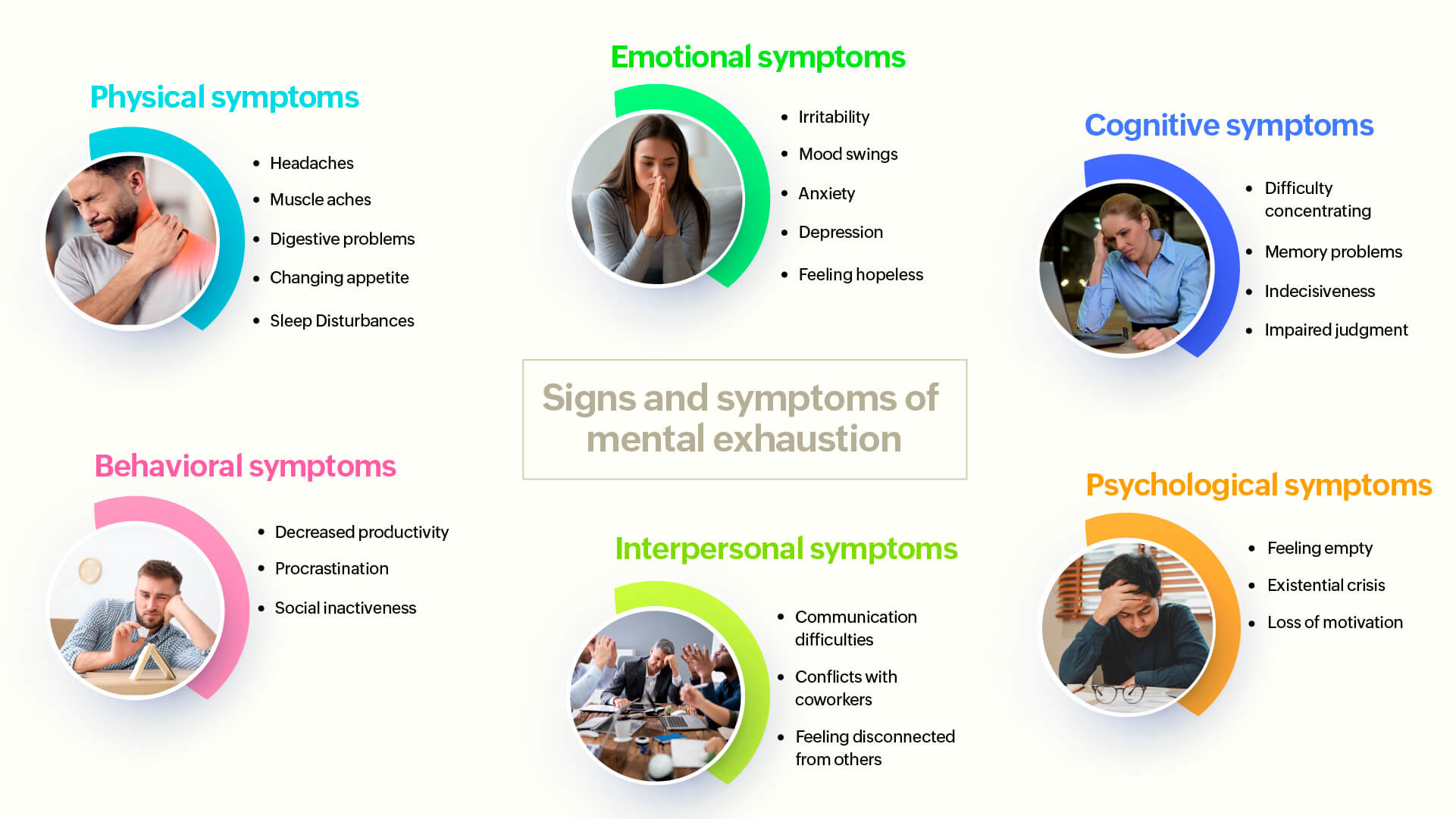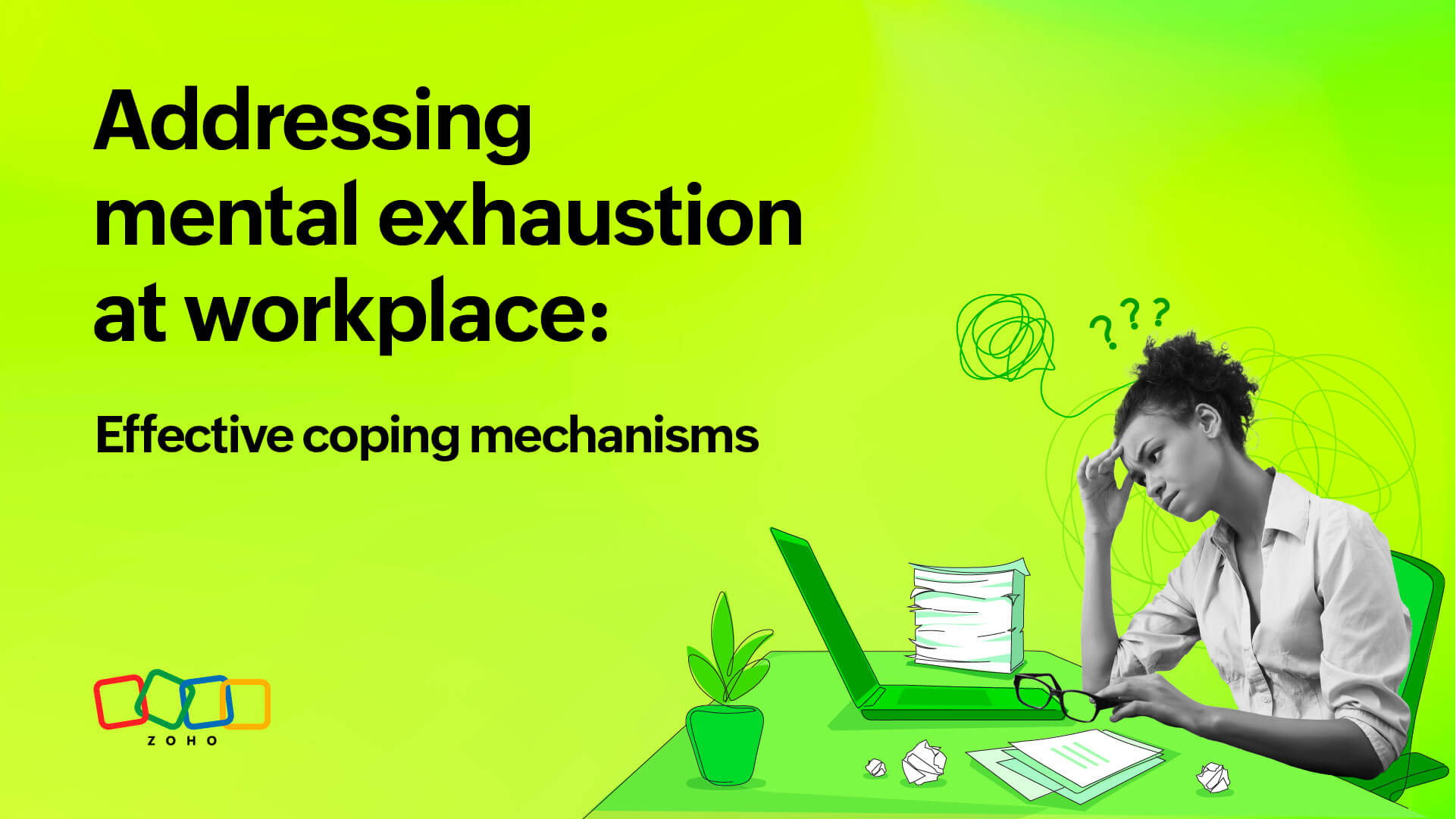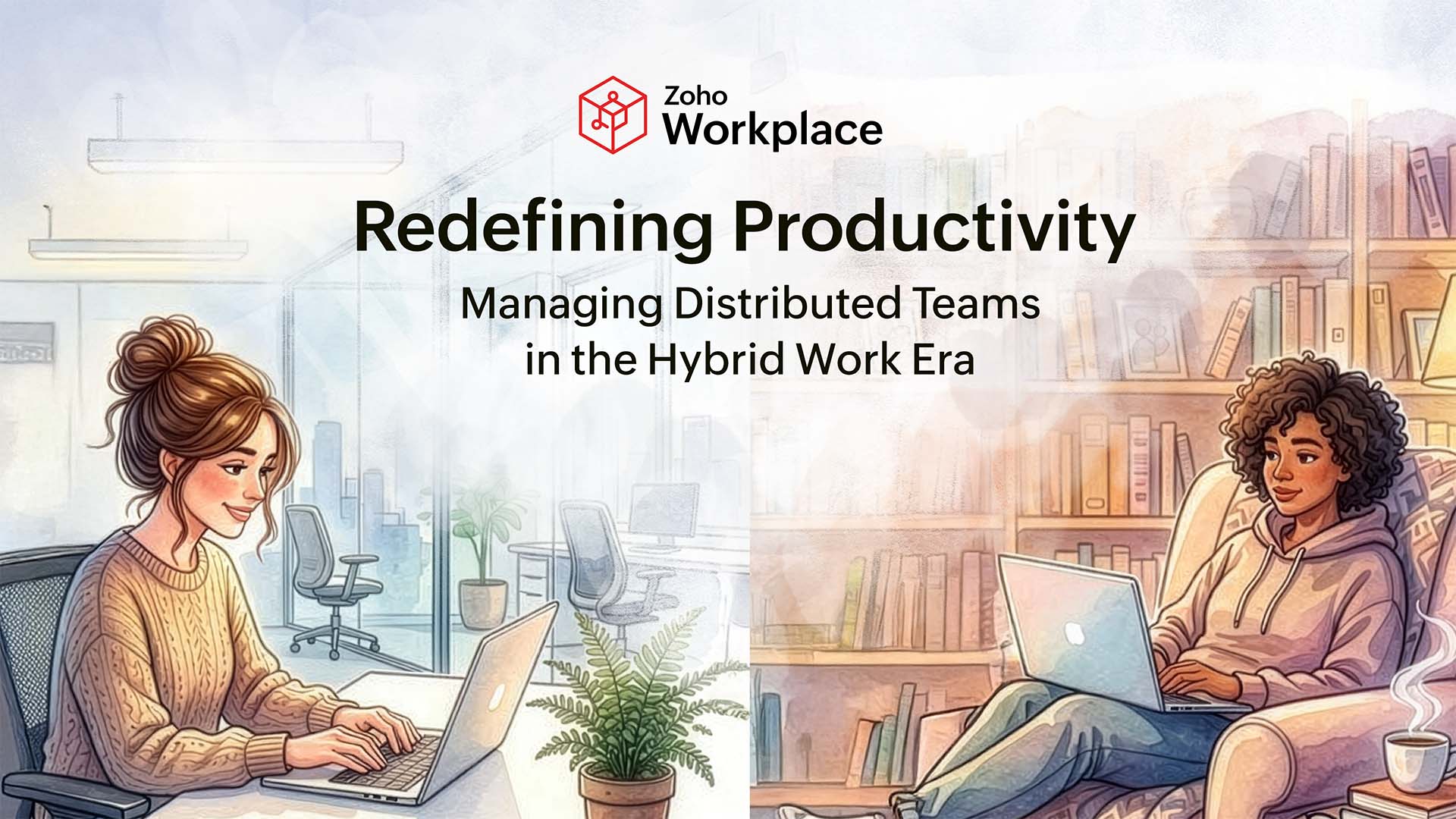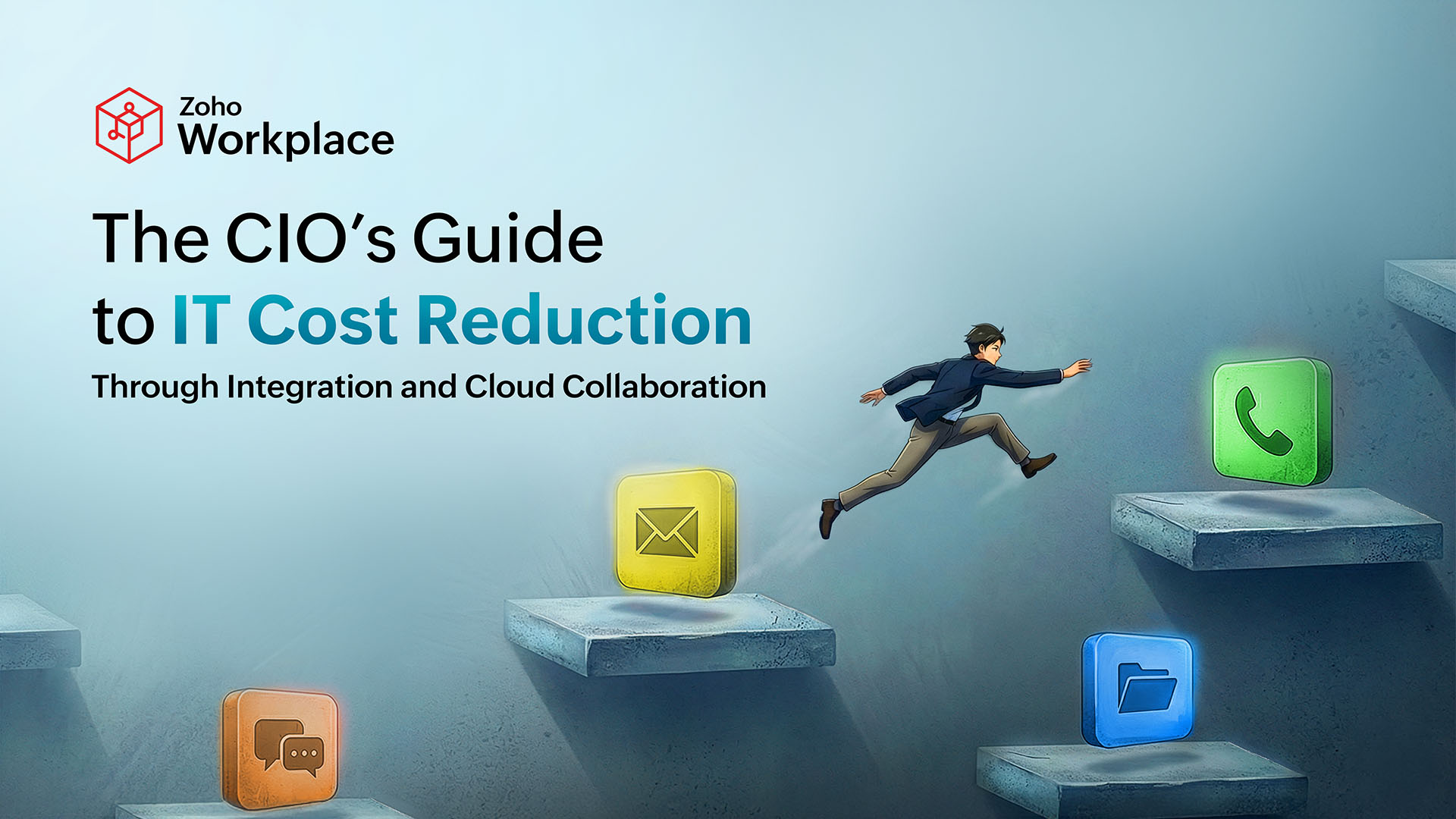- HOME
- All Topics
- Thought Leadership
- Addressing mental exhaustion at workplace: Effective coping mechanisms
Addressing mental exhaustion at workplace: Effective coping mechanisms
- Published : July 25, 2024
- Last Updated : October 17, 2024
- 1.4K Views
- 8 Min Read
At a leading tech company known for its innovative approach and dynamic atmosphere, a team of dedicated professionals work tirelessly to achieve excellence. Despite their passion and commitment, many struggle with a common challenge. Curious to find out what that is? Continue reading.
Anya’s story
Meet Anya, a dedicated marketing executive who loves her job. She starts her day early, attends back-to-back meetings, and juggles multiple projects. As the demands of her role increase, she finds herself constantly working late and responding to emails at odd hours. Over time, she begins to feel increasingly tired, irritable, and unmotivated. She struggles to concentrate, make decisions, and meet deadlines. Despite her best efforts, Anya feels overwhelmed and drained, both mentally and emotionally.
Anya is experiencing mental exhaustion. However, this isn’t something unique to only her. Many employees like her face similar challenges in today's competitive work environment. But what exactly is mental exhaustion, and why is it becoming such a widespread issue? This article will take you through the stories of the employees of this company, highlighting the causes, signs, impacts, and strategies to cope with and prevent this widespread issue.
What is mental exhaustion?
Mental exhaustion, often referred to as burnout, is a state of chronic physical and emotional depletion, resulting from prolonged exposure to demanding work situations. Unlike physical exhaustion, which can be identified easily and treated with rest, mental exhaustion is often subtle and insidious. This requires more comprehensive interventions. It creeps up on individuals gradually, over time.
Causes of mental exhaustion
Work overload and unrealistic expectations
Sofia’s story
A software developer, Sofia finds herself buried under a mountain of coding tasks, each with tight deadlines imposed by her manager. Despite working late into the night and sacrificing her weekends, she struggles to keep up with the ever-increasing workload.
In today's hyper-connected world, you often face relentless demands and unrealistic expectations. Whether it's a plethora of emails, back-to-back meetings, or an unending stream of tasks, the pressure to do more with less can quickly lead to mental exhaustion.
Lack of work-life balance
Jack’s story
Jack is a business development executive who used to love his job so much, but now finds himself constantly tethered to his phone, unable to disconnect from work even during family dinners or vacations. Despite his best efforts to find balance, the boundaries between work and personal life blur into a haze of perpetual stress.
In the 24/7 culture, achieving work-life balance has become increasingly elusive. As technology blurs the lines between work and personal life, you may struggle to switch off and recharge, leading to chronic stress and burnout.
Procrastination
Mike’s story
Mike is also a software developer who struggles to manage personal deadlines. He often procrastinates, convincing himself that he works better under pressure. Because of this, he frequently ends up pulling all-nighters to complete his tasks just before the deadline. As work piles up, Mike feels overwhelmed and drained.
Poor time management and procrastination cause mental exhaustion by creating stress and urgency. Planning ahead and breaking tasks into manageable chunks can help you prevent this. Effective time management enhances your productivity, reduces stress, and promotes a healthier work-life balance, leading to a more sustainable and fulfilling work environment.
Poor management and leadership
Emily’s story
Emily, a sales manager, feels that every aspect of her team's work is constantly being micromanaged by her boss. She tries her best to meet his ever-changing demands, but ends up feeling disempowered and demoralized, leading to a sense of helplessness and frustration.
The relationship between you and your manager can have a profound impact on your well-being. When your manager lacks empathy, communication skills, or trust in you, it can erode morale and contribute to feelings of stress and exhaustion.
Constant multitasking
David’s story
As a project manager, David prides himself on his ability to juggle multiple tasks at once. He believes that multitasking is the key to success. However, as his workload increases and his attention becomes highly fragmented, he starts making mistakes like never before and feels mentally drained.
These days, multitasking has become the norm. However, research suggests that constantly switching between tasks can impair your cognitive function and lead to mental fatigue, ultimately diminishing your productivity and well-being.
Lack of job satisfaction
Haley’s story
A customer service representative, Haley once loved and was devoted to her job but now finds herself counting down the minutes until the end of each workday. Despite her efforts to find fulfillment in her role, she feels disconnected from her work and lacks a sense of purpose.
Feeling unfulfilled or lacking a sense of purpose in your job can take a toll on your mental well-being. Without a sense of meaning or satisfaction, you may struggle to find motivation and engagement, leading to a lack of interest, enthusiasm, and, ultimately, satisfaction.
Toxic work environment
Joe’s story
Joe is one of the company’s human resources managers, and he dreads going to the office each day because he has to deal with problems between people and politics at work. Even though he tries to help solve these fights and make the workplace better, it's exhausting for him because of the never-ending drama and negativity.
Workplace conflicts can create a toxic environment and can wear you down. Whether it's dealing with interpersonal conflicts, bullying, or being in a culture of blame and fear, navigating these toxic dynamics can take a toll on you emotionally. It can lead to feelings of stress, anxiety, and burnout.
Signs and symptoms of mental exhaustion
Mental exhaustion can manifest in various ways, affecting different aspects of your well-being. Understanding the signs and symptoms is crucial for identifying and addressing this condition effectively.

Recognizing these symptoms early can help you take proactive steps to manage mental exhaustion and seek support. Prioritizing mental health is essential for sustaining a healthy and balanced life, both personally and professionally.
Prevention and coping strategies
In different roles and facing unique challenges, people like Sofia, Jack, Emily, David, Haley, and Joe have experienced mental exhaustion firsthand. Today, they demonstrate resilience through proactive steps and thoughtful strategies. Here's what their journey of practicing effective ways to promote mental well-being looks like.
Setting realistic goals and priorities
Sofia
After recognizing her struggle with the overwhelming workload, Sofia decided to have a candid conversation with her manager. She discussed setting more realistic deadlines and prioritizing critical tasks. By breaking her projects into manageable steps and focusing on what truly matters, she was able to regain a sense of control and accomplishment, significantly reducing her stress levels.
You can reduce the risk of mental exhaustion by setting realistic goals, priorities, and expectations. By breaking down tasks into manageable steps and focusing on what truly matters, you can maintain a sense of control and accomplishment, reducing feelings of overwhelm and stress.
Time management and prioritization techniques
Jack and Mike
Realizing the impact of constant connectivity on their mental health, Jack and Mike started using time management tools like to-do lists and calendars. They allocated specific time slots for their tasks and used prioritization matrices to ensure they were focusing on the most important work first. This helped them manage their time wisely and strike a better work-life balance.
Effective time management and prioritization are essential skills for preventing mental exhaustion. You can benefit from using tools and techniques—such as to-do lists and calendars—to organize your tasks, allocate your time wisely, and maintain a healthy work-life balance.
Establishing work-life boundaries
Emily
Feeling disempowered by her micromanaging boss, Emily decided to set clear boundaries between her work and personal life. She established regular work hours, ensured she took breaks throughout the day, and disconnected from work during evenings and weekends. This helped her recharge and approach her work with renewed energy.
Creating clear boundaries between work and personal life is crucial for preventing mental exhaustion. You can benefit from establishing regular work hours, taking breaks throughout the day, and disconnecting from work during evenings, weekends, and vacations to recharge and rejuvenate.
Seeking support from colleagues, mentors, or counselors
David
Struggling with the effects of constant multitasking, David reached out to a mentor within his organization. By sharing his challenges and receiving guidance on effective task management, he gained new perspectives and strategies for handling his workload more efficiently. This support was crucial in helping him cope with his mental exhaustion.
Open communication and seeking support from colleagues, mentors, or counselors can help you cope with mental exhaustion. By sharing your feelings, experiences, and challenges with trusted individuals, you can gain perspective, receive guidance, and access resources and support to navigate your struggles effectively.
Taking regular breaks and vacations
Haley
After having felt disconnected and unfulfilled in her job, Haley decided to prioritize taking regular breaks and using her vacation time. She engaged in activities she enjoyed outside of work, which helped her relax and recharge. This approach allowed her to maintain a healthier work-life balance and improved her overall well-being.
Taking regular breaks throughout the day and using vacation time to rest, relax, and recharge are essential for preventing mental exhaustion. You should prioritize self-care and make time for activities you enjoy outside of work to maintain a healthy work-life balance and overall well-being.
Engaging in stress-reduction activities
Joe
To deal with the toxic work environment, Joe turned to stress-reduction activities such as mindfulness and meditation. He also took up hobbies that he found relaxing and fulfilling. These activities promoted relaxation, improved his mental clarity, and helped him build resilience against the stressors in his workplace, enabling him to maintain his mental health and well-being.
Engaging in stress-reduction activities, such as mindfulness, meditation, exercise, and hobbies, can help you manage and reduce the symptoms of mental exhaustion. These activities can promote relaxation, improve mental clarity, and enhance resilience, empowering you to cope with stressors more effectively and maintain your mental health and well-being.
The role of organizational culture
Creating a supportive and inclusive work environment is essential for your well-being. Organizations can do this by prioritizing mental health with policies that encourage open communication, empathy, and understanding. By creating a culture of respect and providing resources for employees facing challenges, workplaces can prevent mental exhaustion and promote a healthier atmosphere overall.
Leaders and managers play a crucial role in supporting mental well-being within their teams. By leading with empathy, showing care, and prioritizing employee health, you can create a positive work environment. Recognizing and rewarding contributions, promoting a work-life balance, and encouraging team-building activities are effective strategies. These efforts not only enhance satisfaction and productivity but also reduce the risk of burnout among your team members.
Conclusion: Take steps towards wellness
Mental exhaustion is a serious issue affecting many in today's fast-paced working style. Recognizing the signs, such as fatigue, headaches, and a weakened immune system, is the first step towards addressing it. By prioritizing self-care, setting boundaries, and seeking support when needed, you can prevent and manage this. Employers also play a crucial role by paving the way for a supportive and balanced work culture. Together, you and your employer can create healthier, more sustainable workplaces where everyone thrives.
 Anjana Balaji
Anjana BalajiAnjana is a passionate marketer who works for Zoho. Apart from the crazy movie buff that she is, she's also a trained musician and a creative home-chef!



